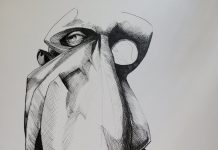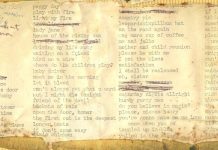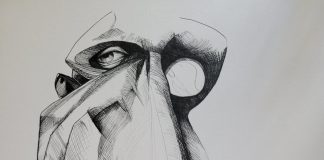They tore down a part of my hometown last week,
imploded it to be precise, dissolved it from the inside
as with cancer. A crowd came to admire the reek
of the ordnance and the trail of the plume adrift
in the spring sky like the tail of a Northern Shrike.
Then they queued their cars and left another to sift
through the remnants—the ash from all those lives,
which so clearly did not deserve an urn. More than
two thousand miles away, I chose between knives
to cut through the clotted line between my flagging
mealworm and the Colorado River, sacrificing one
life in the lost pursuit of another and then sighing
at the burden of it all. I could not watch the real-time
feed of the so-called action. Rather, I placed a wet
kiss on the memory of a blue flame, its dance sublime
enough to make a teenage boy swoon, helpless
in light of the sight available through the latticework
provided by a pew’s worth of stunted sweet birches.
Years have taught me beauty is the beginning of a lie,
in this case the reassurance that a city’s worth of men
were vital cogs in the innards of the machine. My
friends’ fathers could buy groceries, gasoline and beer
as long as the boxcar loads of I-beams, battleships and
bridge trusses rattled off in the dark of night. All fears
guns put us high on the Russians’ list were unfounded;
besides the pesky Japanese were coming for us all again.
If your daily dose of heavy metal was not what you wanted,
there was always another to take your place on the line.
Show loyalty to God and country by buying American.
Dot each yard with a “USW-Stop Illegal Imports” sign.
No matter what the papers said, the good times rolled
at Steel. Those laid off were dead weight or likely to be
called back anyway. Not a single one of them sold
their house quietly and pulled kids from Catholic high.
And it must by a failed memory of my father’s tattered
tie and skinned knuckles, the night I watched him cry
on our front porch because there was nothing else to do
but step into it when a frustrated larryman opted to take
everything out on his wife. “The good book gives you
no guidance when it comes to things like this,” he told
my mother, then made for the laundry on creaking knees,
followed by her reminder getting out blood required cold
water. There was plenty of that to go around in a mill
town, but drinking it was another matter altogether. So
they tossed it on a slag pile of summer-home dreams until
the steam was as thick as the mid-April fog bedded down
between the bunkers on the 13th hole of the Old Course.
If you didn’t choke on the irony, you could double down
for a shot of the double standard, that dose of bitterness
served by the National Sokols or Wanderers—drowning
out the sound of your pension slipping off into the abyss.
The distance between us and them was framed in twenty-one
stories stacked in the shape of a cross to satisfy a Jesus
complex that kept my Little League field from seeing the sun.
That is why I did not watch, like some iron pig satisfied
in a pool full of my own shit not to mention the run-off
foisted on me and mine by nearly every suit who lied
about the next big contract or plan to streamline. I refuse
to cry over the Carrara tile or mahogany panels, though
I am sure they were salvaged for some other thieves’ use,
and I hesitate to spend too much energy waxing nostalgic
over a warehouse full of promises that never seemed to stick.































